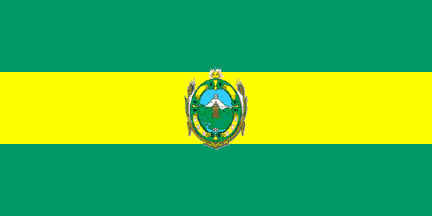
image by Jens Pattke, 29 October 2002

Last modified: 2014-05-17 by zoltán horváth
Keywords: pichincha | cayambe |
Links: FOTW homepage |
search |
disclaimer and copyright |
write us |
mirrors

image by Jens Pattke, 29 October 2002
See also:
Based on image from provincial
website.
Falko Schmidt, 29 October 2002
The canton was formed on 25 June 1824.
The descriptions of the symbols at provincial
website:
"The flag is of rectangular shape, with a yellow stripe
between two green stripes and with the canton's coat of arms in
the yellow stripe."
"The coat of arms is surrounded by a green and yellow orle.
The orle is ringed in four parts forming a cross and is charged
with six silver castles, representing the parishes merged to form
the canton of Cayambe in 1883 [However, the canton was formed on
25 June 1824, according to the data provided by the Association
of Ecuadorian Municipalities. I.S]: Tabacundo, Cangahua,
Guayllabamba, Otón, Malchinguí and Tocachi.
The red ribbon means the active contribution of the inhabitants
to the overthrowing of President General Ignacio de Veintimilla
[I can't see any red ribbon on the coat of arms. Ignacio de
Veintimilla (1829-1908) ruled Ecuador as a dictator from 1878 to
1882, when he was overthrown and exiled to Peru. See his
biography on the Ecuadorian
presidential website. I.S.].
The golden castle in the middle represents the village of
Cayambe. The golden cross surmonting the castle represents the
Catholic religion. On a dark blue field is placed the majestuous
Mount Cayamburo, today known as Cayambe, covered with snow and
reaching 5,790 m asl. An earth's sphere crowning the mountain
represents its location on the equator line.
The golden and emerald colours of the fields and hills represent
the valley's fertility and resources.
In the base of the shields flows a blue river representing the
Ewes' River, today known as Granobles; a white lily represents
St. Mary Ann of Jesus, known as 'The White Lily of Quito'.
[Mariana de Jesús Paredes Flórez (1618-1645), awarded the title
of "National Heroin" in 1946 by the Congress of Ecuador
and canonized by Pope Pius XII. See her biography on the EWTN
website. I.S.]
Two golden spikes flanking the shield symbolize the wheat fields
and ripe grain provided by the valley during harvest.
A golden sun surmonts the upper part of the canton's shiled as a
representation of the rubicund Phoebus [A byname used by the
Latin classic writers (for instance, Ovid) for the sun god.
I.S.], which generates vegetal and animal life by its warmth,
movement and light."
The same information can be retrieved much more easily from the Cayambe
municipal website, but the image of the coat of arms here has
weird colours (the castles are yellow and the river is white,
while prescribed as silver and blue, respectively).
Ivan Sache, 20 October 2008
p-cay.jpg)
image from <www.pichincha.gov.ec>,
located by Falko Schmidt, 29 October 2002